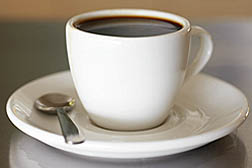Read the magazine
story to find out more. |

Among 53 dietary supplements analyzed by ARS,
caffeine levels ranged from about zero to 800 milligrams per serving. For
comparison, there are 95 milligrams of caffeine in a cup of coffee. Photo
courtesy of Microsoft Clipart.
|

|
Analyzing Caffeine in Selected Dietary Supplements
By Rosalie Marion Bliss
April 1, 2009 About half of adults in the United States report consuming dietary supplements regularly. What they may not know is that some of these supplements contain caffeine, even if it’s not listed on the label. Now, Agricultural Research Service (ARS) scientists in Beltsville, Md., have analyzed a number of caffeine-containing products to explore caffeine levels in segments of the U.S. dietary supplement market.
Caffeine is a natural alkaloid that occurs not only in tea and coffee, but also in more than 60 other plants and in plant derivatives known as "botanicals." These botanicals, such as guarana, yerba mate, kola nut and green tea extract, are common dietary-supplement ingredients and are printed on the label's ingredient list.
In the United States, there is no requirement to state the amount of caffeine present in a food, beverage or supplement on the product's label. If caffeine in its pure form is added to a product, however, there is a requirement to add the word "caffeine" to the label's ingredient listing.
The project was headed by the ARS Nutrient Data Laboratory’s (NDL) dietary supplements group, led by nutritionist Janet Roseland. Dietary supplements--predominantly weight-loss and sports-nutrition products containing at least one caffeine-containing ingredient--were chosen for analysis from multiple channels, including health food outlets, supermarkets, Internet vendors and fitness clubs.
Approximately half of the tested products contained the caffeine equivalent of up to two cups of coffee per day. Of the 28 analyzed products that voluntarily listed a caffeine amount on the label, 25 were found to contain caffeine levels within 20 percent of the label amount.
For this project, NDL researchers collaborated with and received funding from the National Institutes of Health (NIH) Office of Dietary Supplements (ODS) and the Food and Drug Administration (FDA). The study reported the caffeine values for 53 unnamed U.S. dietary supplements in the journal Analytical and Bioanalytical Chemistry.
Read more about this research in the April 2009 issue of Agricultural Research magazine.
ARS is the principal intramural scientific research agency of the U.S. Department of Agriculture.